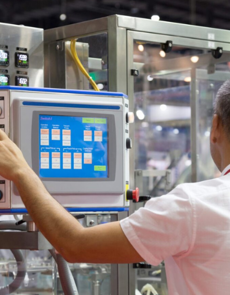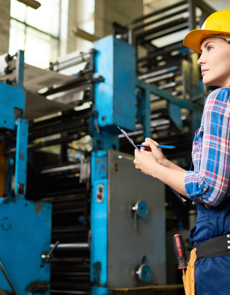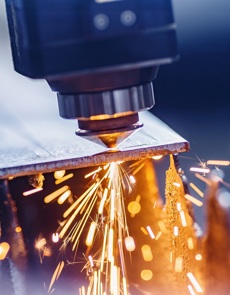AI in Manufacturing: Everything You Need to Know, From Benefits to Use Cases
The manufacturing industry has always benefited from technological breakthroughs, whether automation or advanced data analysis. Today, industry leaders are turning to artificial intelligence (AI) in manufacturing to unlock further productivity gains.
To outcompete during the Fourth Industrial Revolution, otherwise known as Industry 4.0, manufacturing companies must investigate ways to streamline their processes. Of all the technology promising to do so, artificial intelligence enables the most wide-ranging solutions.
But how exactly does artificial intelligence in manufacturing enable companies to make efficiency gains? And what does the future of AI in manufacturing look like?
In this article, we'll outline the benefits and disadvantages of adopting artificial intelligence, break down AI trends in manufacturing, and explore practical use cases so you can make better decisions around your future digital transformation strategy
What is AI in manufacturing?
Artificial intelligence is a broad category, but at its core, it describes technology that can simulate human actions and thought processes. One of the most exciting advances in recent years has been Generative AI, which can generate content like text, images, and videos through text-based prompts.
Although generative AI can be employed in the manufacturing industry—for example, in creating customer service chatbots or new software code—it's not the only type of AI that can benefit the sector.
When we talk about artificial intelligence in manufacturing, we're also referring to the use of machine learning (the ability to learn from data), computer vision (the ability to understand visual prompts) and robotics (the ability to perform physical tasks autonomously).
Manufacturers have been using some of this technology for many years. For example, industrial robots have been a staple on production lines since the 1960s, while CAD has streamlined product design to allow for more complex manufacturing methods.
More advanced types of AI, such as advanced machine learning models, are still in the early stages of adoption by the manufacturing industry. However, companies are doubtless optimistic about the benefits of these innovations.
How AI is impacting manufacturing
Artificial intelligence technology has already contributed to many innovations in manufacturing. However, the rate of AI investment in recent years has resulted in many more use cases for AI deployment.
Manufacturing sector leaders identify three broad areas of manufacturing operations that are poised to benefit most from AI: predictive insights, decision-making, and planning.
Integrating AI in these areas will affect productivity across the entire manufacturing operation, enabling companies to speed up production lines and respond more quickly to disruptions.
- Data and insights
Data collection and analysis are staples of digital transformation strategies in the manufacturing sector (according to one survey, 90% of machinery companies already collect and store production data). Operations data gathered across the supply chain enables companies to identify areas of weakness and solve operations problems faster.
Machine learning allows vast quantities of data to be analysed much faster than by a human analyst. When augmented with human decision-making, artificial intelligence in manufacturing enables companies to identify problems more quickly and more accurately predict future points of failure.
- Decision-making
Quality decision-making from company leaders has become even more critical to manufacturing success in recent years. The sector has dealt with multiple crises, from COVID-19 to significant global supply chain disruption, and faster responses can be a critical factor in outperforming competitors.
Machine learning can augment human decision-making by offering instant insights and recommendations. For example, an AI model may identify patterns leaders aren't aware of, enabling them to make empowered operational decisions.
- Planning
AI's predictive capabilities are the most impactful when it comes to planning and strategising. By synthesising information from multiple sources, artificial intelligence can influence how companies plan for the future.
Today, manufacturing software solutions are being developed to tackle multiple challenges simultaneously. These solutions offer companies insights into operations and AI predictions to enable future efficiency.
Examples of AI in manufacturing
AI doesn't just benefit large-scale manufacturing operations. Even companies with more modest operations will find that AI innovations—which are quickly becoming more affordable—will enable faster production and more valuable insights.
- Generative AI in CAD
Generative AI is a powerful tool when combined with traditional computer-aided design in the early manufacturing process. Companies that have embraced generative AI in the design process, enabling engineers and designers to create imagery and designs from text prompts, see a 70% reduction in product development cycle times.
In the future, machine learning models trained on a company's products and manufacturing processes could even recommend the most efficient manufacturing process for new products, eliminating waste and bottlenecks.
- Digital twins
Digital twins are a core technology in AI-augmented decision-making. The phrase describes virtual models that can simulate the effects of specific scenarios. Manufacturers can use digital twins of products or entire factor environments to mimic operational changes and make productivity predictions.
Already, 44% of respondents to an industry survey said they are using this type of predictive AI in smart manufacturing to evaluate production processes and predict costly bottlenecks.
- Computer vision
Computer vision—a computer's ability to extract information from images and video—isn't new. Many companies already use some form of this technology in their production processes, most notably for quality inspection. However, advancements in machine learning models have allowed for significant improvements in computer vision, and use cases are now widespread.
Manufacturers are using advanced computer vision, often in combination with autonomous robotics like drones, to monitor inventory, identify safety hazards, drive efficiencies in packaging, and monitor equipment for defects.
What are the benefits of AI in manufacturing?
The advantages of artificial intelligence in manufacturing are numerous. However, as manufacturers are still in the early stages of adopting the technology, many companies have only scratched the surface of the possible use cases and benefits of AI technologies.
- Identify production issues faster
Technology such as computer vision allows manufacturers to identify operations disruptions like equipment failures and defects more quickly than through human analysis alone. In these cases, manufacturers are seeing a 30-40% increase in first-pass yield compared to before implementing AI.
- Redirect employees to high-value tasks
A largely overlooked benefit of implementing AI in manufacturing is the subsequent upskilling it can offer workers. By referring repetitive and administrative tasks to automated programs, human workers can spend more time on high-level, strategic problems, unlocking new business opportunities.
- Increase production capacity
With AI-driven predictive analysis, inventory management becomes more streamlined and efficient. In the most extreme cases, manufacturing companies have seen a 140% increase in throughput thanks to trained AI models.
See how AI is shaping the future of manufacturing
Are there disadvantages of AI in manufacturing?
Despite the optimism surrounding employing AI in manufacturing, few companies are on their way to reaping the rewards of this technology. In the UK, manufacturing is the sector least likely to use AI technology already, pointing to a possible reluctance to go all-in on implementation.
Among the common barriers to AI adoption in the manufacturing sector are employees' lack of technical knowledge and trust in AI in general. These barriers align with some of the technology's well-known risks and the disadvantages of AI in manufacturing.
- Data security
Advanced machine learning models are built on vast amounts of data. While data collection is the norm in digital-forward manufacturing companies today, using large datasets to train AI can introduce significant cybersecurity risks.
In a worst-case scenario, data breaches can cost companies millions in penalties from organisations like the Information Commissioner's Office (ICO). Plus, there are increased risks of data leaks via AI models trained internally on confidential company data, which could easily compromise company performance if disclosed.
Poor-quality data inevitably results in poor AI recommendations and solutions, and without confidence in the original data, building AI solutions can be a costly waste of time.
- Cost
Cost is of particular concern for SMEs. Studies across AI in manufacturing in China have revealed that 91% of AI projects at companies fail to meet expectations, either because they underperform or are too costly.
Given increased costs across the supply chain, particularly in energy and raw materials, many companies will naturally hesitate to invest in AI.
Despite these significant obstacles, many companies are experimenting with AI in manufacturing, and in some areas of operation, the benefits undoubtedly outweigh the disadvantages.
Top AI trends in manufacturing
According to recent AI in manufacturing statistics, although 96% of manufacturing firms plan to use AI, over half are still in the piloting or experimenting phase. Regardless, the sector is rapidly discovering where AI can maximise benefits.
These AI trends in manufacturing should be the priority for companies eager to begin exploring the best use cases for AI and seeking the most cost-effective solutions.
- Predictive maintenance
Most manufacturing leaders (64%) believe predictive maintenance is one of the manufacturing processes that will most benefit from AI. Unplanned downtime can be incredibly costly, so any solution that can identify and anticipate equipment breakdowns will offer significant ROI.
When combined with computer vision technology, AI models can monitor equipment in real time and, through analysis of existing data and predictive analytics, anticipate when faults are likely to occur. This enables companies to perform proactive maintenance rather than on-the-spot repairs.
- Quality control (QC)
Improving quality control is a vital focus for the sector, and this is reflected in the number of startups currently developing AI solutions for this challenge. Technology like computer vision can considerably speed up quality checks and defect detection, lowering costs and speeding up the production line. While human analysis is still valuable in QC, AI can often catch defects that a human eye can't.
- Inventory optimisation
Inventory optimisation is a complex challenge for manufacturers, as external events beyond their control can significantly impact materials availability and product demand. Similarly, as manufacturers work towards more sustainable processes, waste reduction is a prominent issue.
AI can benefit every facet of inventory optimisation, from supply to distribution. Machine learning models trained on a company's existing supply and demand data can use predictive analysis to implement a Just-in-Time (JIT) inventory management strategy, ensuring companies have the exact stock they need when they need it.
Top use cases for AI in manufacturing
The use of AI in manufacturing can vary considerably across industries and companies depending on specific business needs. However, the overall sector's enthusiasm for AI use is almost universal—93% of manufacturing companies believe AI will drive growth and innovation.
AI in pharmaceutical manufacturing
- Quality control
It's vital that pharmaceutical manufacturers follow regulatory requirements. Generative AI and other advanced machine-learning models can enable pharmaceutical companies to better investigate the root cause of manufacturing defects and roll out solutions faster.
- Inventory forecasting
Virtual assistants can be deployed to predict supply and demand trends, ensuring optimal stock levels. McKinsey data predicts that this innovation could result in a 2-3% reduction in supply chain costs.
AI in automotive manufacturing
- Supply chain visibility
Automotive manufacturing is a complex process involving hundreds of suppliers and production lines. When just one car can comprise up to 25,000 individual components, achieving the end goal of optimised JIT manufacturing can be a challenge.
An AI model can respond faster to external events through real-time data, producing more accurate demand forecasts. Research suggests that using AI in demand forecasting could reduce errors by up to 50%.
- Optimised distribution
Automotive manufacturer Skoda has recently begun using AI software to determine the most efficient way of loading pallets to maximise capacity when delivering materials and supplies through the supply chain.
AI in food manufacturing
- Efficient use of materials
Of all the manufacturing sectors, the food industry is perhaps most at risk from unanticipated external disruption. As climate change creates more extreme weather events, manufacturers must contend with more drastic alterations in the supply and demand of ingredients.
Advanced machine learning models will help manufacturers use land and raw materials efficiently by incorporating disaster risk mapping and seasonal fluctuations into recommendations.
- Quality control
Producing goods for consumption, as in the pharmaceutical industry, also requires stringent quality control. Human errors in QC contribute to high levels of food waste in manufacturing and endanger food safety, increasing the risk of pathogens in food.
AI can improve QC outcomes by analysing product lines faster and diagnosing the root cause of food quality issues, such as factory temperature errors or human oversight.
What is the future of AI in manufacturing?
The use of artificial intelligence in manufacturing is still nascent, but the sector is eager to reap the rewards of AI innovations. With most companies at least aware of the competitive advantages, if not already implementing solutions, to ignore AI in manufacturing is to fall behind.
With the Fourth Industrial Revolution on the horizon, the use of AI in smart manufacturing will only increase. Indeed, many of the goals of smart manufacturing and smart factories—streamlining traditional manufacturing operations and boosting efficiency—will only be achieved with AI-augmented or AI-led solutions such as those described above.


